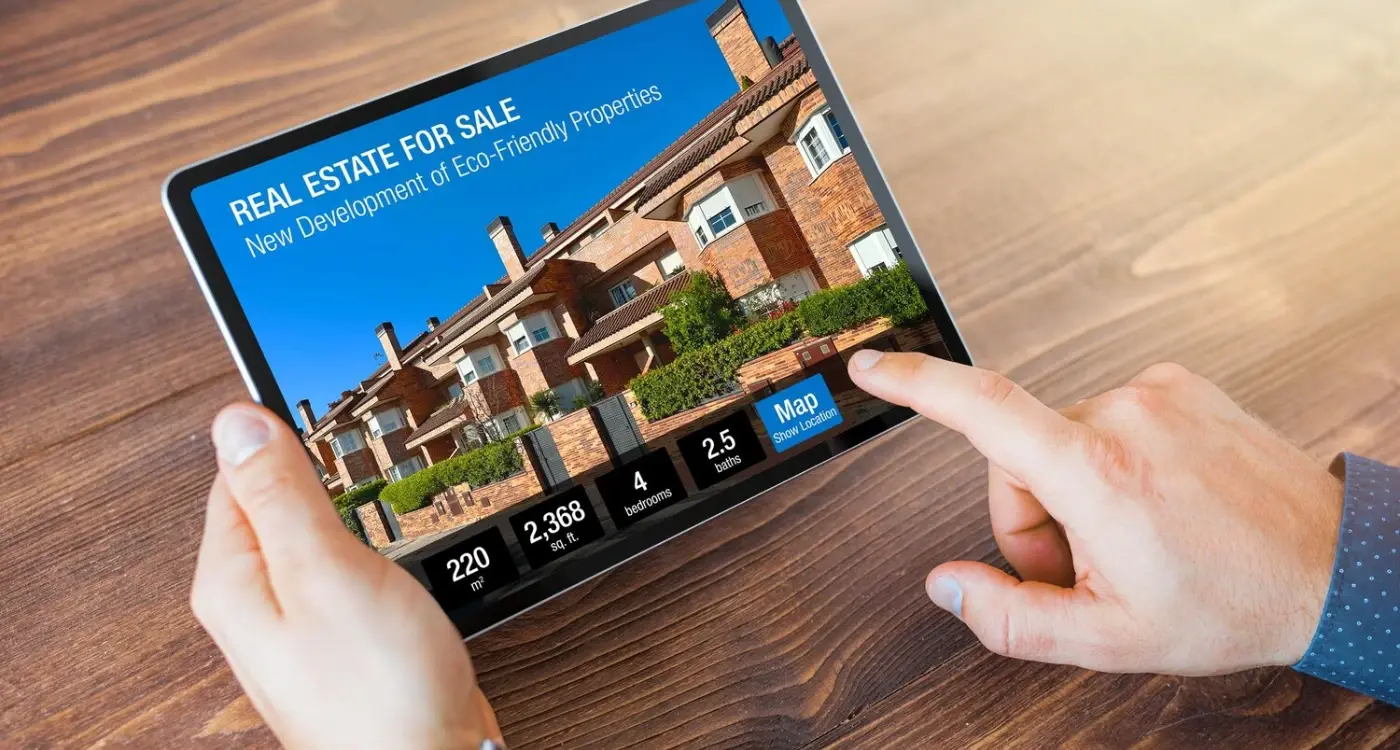What Features Should My Estate Agent App Have to Win Over Customers?
Over 90% of property searches now start on mobile devices, yet most estate agents are still relying on desktop websites and phone calls to win customers. That's a massive missed opportunity when you consider how much time people spend browsing properties on their phones during commutes, lunch breaks, and evening scrolling sessions.
The estate agent industry has been slow to embrace mobile apps, which is actually good news if you're thinking about building one. There's still plenty of room to get ahead of competitors who are stuck in the past. But here's the thing—just having an app isn't enough anymore. People expect apps to work brilliantly and solve real problems, not just display listings in a mobile-friendly format.
The best estate agent apps don't just show properties; they create relationships between agents and potential buyers that lead to actual sales
I've worked with estate agencies across the UK, and the ones that succeed with mobile apps understand something important: customer acquisition through apps is about more than fancy features. It's about understanding what property buyers and sellers actually want when they're using their phones. They want quick answers, easy communication, and tools that help them make decisions faster. Get those basics right, and you'll see more leads, happier clients, and agents who actually use the technology you've invested in. The agencies that ignore mobile apps? They're watching potential customers slip away to competitors who make property hunting effortless on smartphones.
Core Features Every Estate Agent App Must Have
I've worked with enough estate agents over the years to know that getting the basics right is what separates successful apps from the ones that get deleted after a week. You can have all the fancy bells and whistles you want, but if your app doesn't nail these core features, you're wasting your time and money.
Let's start with property listings—this is your bread and butter. Your app needs to display properties clearly with high-quality photos, detailed descriptions, and accurate pricing. But here's what many agents miss: the listings need to sync in real-time with your main database. Nothing annoys potential buyers more than clicking on a property that's already sold.
The Non-Negotiable Features
Search functionality comes next, and it needs to be smart. Users should be able to filter by price, location, property type, and number of bedrooms without the app crashing or taking forever to load results. Map integration is part of this too—people want to see exactly where properties are located and what's nearby.
- High-quality photo galleries with zoom functionality
- Property comparison tools
- Saved searches and favourites
- Push notifications for new matches
- Contact forms that actually work
- Mortgage calculator
The contact system deserves special mention. Your app should make it ridiculously easy for users to get in touch—whether that's requesting a viewing, asking questions, or booking a valuation. If someone has to jump through hoops to contact you, they'll find an agent whose app makes it simple.
One feature that's often overlooked is offline access. Your app should store recently viewed properties so users can browse them even when their signal drops out. Trust me, this small touch makes a big difference to user satisfaction.
User Experience Elements That Drive Customer Engagement
Getting people to download your estate agent app is one thing—keeping them coming back is another beast entirely. I've worked on dozens of property apps over the years, and the ones that succeed aren't just the ones with the most features. They're the ones that feel right when you use them.
Speed matters more than you might think. When someone's browsing properties, they want instant results. If your app takes more than three seconds to load property images, you've already lost them. People will literally close the app and open a competitor's instead. The search function needs to be lightning fast too—nobody wants to wait around when they're looking for their dream home.
Making Navigation Feel Natural
Your app's navigation should be so simple that users don't even think about it. The best estate agent apps feel like they read your mind; you tap where you expect to tap, and everything just works. Keep your main menu items to five or fewer—any more and people get confused about where to go.
Personal Touches That Keep People Coming Back
Personalisation is where the magic happens for customer acquisition. When your app remembers someone's search preferences, favourite properties, and budget range, it transforms from just another property app into their property app. Push notifications work brilliantly here, but only when they're relevant. Send alerts about price drops on saved properties or new listings that match their criteria—not random promotions.
Add a quick tutorial that appears the first time someone opens your app. Keep it under 30 seconds and show them the three most important features they'll actually use.
The most successful estate agent apps I've built focus on removing friction at every step. When browsing feels effortless and finding properties feels personal, that's when casual browsers become serious customers.
Property Search and Discovery Tools That Convert Browsers Into Buyers
Here's the thing about property search—people know what they want, but they can't always describe it properly. I've seen countless estate agent apps with basic search filters that only cover price, bedrooms, and location. That's not enough anymore. Your app needs to think like a human brain and understand that someone searching for a "family home" might actually want a garden, good schools nearby, and parking space.
Smart search functionality should include visual elements that make browsing feel natural. Map-based searching works brilliantly because people think geographically—they want to see where properties sit in relation to their workplace, their children's school, or their favourite coffee shop. But here's what most apps get wrong: they make users choose between map view and list view instead of blending both together seamlessly.
Search Features That Actually Work
The best property discovery tools use layers of filtering that don't overwhelm users. Start with the obvious filters, then let people dive deeper as they browse:
- Intelligent keyword search that understands "period features" or "modern kitchen"
- Commute time calculator from specific addresses
- School catchment area overlay on maps
- Lifestyle filters like "pet-friendly" or "first-time buyer suitable"
- Visual similarity search using property photos
- Price history and market trend data
Making Browsers Take Action
Converting casual browsers into serious buyers comes down to timing and relevance. Your app should learn from user behaviour—if someone keeps looking at Victorian terraces in specific areas, start showing them similar properties before they hit the market. Push notifications work when they're personalised and timely, not when they're generic spam about every new listing.
The magic happens when you combine smart algorithms with human insight from your agents, creating a discovery experience that feels both personal and professional.
Communication Features That Build Trust Between Agents and Clients
Trust is the foundation of every successful property transaction, and your estate agent app needs to make building that trust as simple as possible. When clients can communicate easily with their agents, they feel more confident about one of the biggest financial decisions of their lives. The communication features you choose can make or break the customer acquisition process.
In-app messaging should be your first priority. Clients want quick responses to their questions, and agents need a professional way to stay in touch without sharing personal phone numbers. Push notifications keep everyone informed when new messages arrive, but make sure users can control how often they receive them—nobody wants their phone buzzing every few minutes!
Real-Time Updates That Keep Clients Informed
Property alerts and status updates are absolute game-changers for client satisfaction. When a viewing gets scheduled, cancelled, or moved, clients should know immediately through the app. The same goes for offer updates, mortgage progress, and any changes to property availability. Clients hate being left in the dark, and these features prevent that frustration before it starts.
The key to successful customer acquisition in estate agency is removing uncertainty from the process—clients who feel informed are clients who stick around
Video Calls and Virtual Viewings
Built-in video calling capabilities have become standard expectations rather than nice-to-have features. Agents can conduct virtual viewings, explain complex documents face-to-face, or simply have a quick chat about property concerns. This personal touch builds stronger relationships than text messages alone ever could. The easier you make it for agents to connect personally with their clients, the more likely those clients are to recommend the service to others.
Marketing Tools That Help Agents Stand Out From Competitors
The estate agent market is packed with competition, and standing out isn't easy. Your app needs marketing features that give agents real advantages over their rivals—not just flashy tools that look good but don't deliver results.
Social media integration sits at the heart of modern property marketing. Agents need to share listings across Facebook, Instagram, and Twitter with just one tap. But here's what most people miss: the sharing needs to be smart. Your app should automatically resize photos, add compelling captions, and schedule posts for peak engagement times. Simple sharing isn't enough anymore.
Lead Generation Features That Actually Work
Property alerts and saved searches generate leads, but only if they're done properly. The best apps track user behaviour—which properties they view, how long they spend looking, what they share with others. This data helps agents understand what buyers really want, not just what they say they want.
Virtual tours and video walkthroughs are becoming standard, but interactive floor plans with measurement tools set you apart. Buyers can visualise their furniture in the space and calculate if their sofa will fit through the door.
Analytics That Drive Better Marketing Decisions
Your app should track everything: which listings get the most views, what search terms buyers use, which photos perform best. Agents can then adjust their marketing strategy based on real data, not guesswork.
- Automated email campaigns for new listings matching buyer criteria
- WhatsApp integration for instant property updates
- QR code generation for property brochures and window displays
- CRM integration to track lead conversion rates
- Customisable branding options for agent profiles and listings
The agents who win are those who use technology to build genuine relationships with their clients, not just broadcast listings into the void.
Property Management Features That Streamline Agent Workflows
Estate agents juggle dozens of properties at once—and without the right tools, things get messy fast. Your app needs to handle the behind-the-scenes work that keeps agents organised and productive. When workflows run smoothly, agents can focus on what they do best: selling properties and winning customers.
Calendar and Task Management
A good estate agent app includes smart scheduling tools that sync viewings, meetings, and follow-ups in one place. Automated reminders stop things falling through the cracks; nobody wants to miss a viewing because they forgot to check their diary. Task lists that link to specific properties help agents track progress from listing to sale completion.
Document and Contact Management
Property sales generate mountains of paperwork—contracts, certificates, surveys, and correspondence. Your app should store everything digitally with quick search functions. Agents waste too much time hunting for documents when they could be closing deals.
Contact management goes beyond basic details. Smart systems track interaction history, preferences, and buying behaviour. When an agent knows a client prefers period properties under £500k, they can target their approach perfectly.
Include automated progress tracking that shows exactly where each property sale stands in the pipeline—this single feature can save agents hours every week.
Performance analytics help agents spot patterns in their work. Which properties sell fastest? What times work best for viewings? Data-driven insights help agents refine their approach and close more sales. The best property management features work quietly in the background, making agents more efficient without adding complexity to their day.
Integration Capabilities That Connect Your App to Existing Systems
Estate agents already use loads of different systems to run their business—CRM platforms, property management software, accounting tools, email marketing systems. The last thing they want is another app that sits on its own island, completely separate from everything else they're already using. That's where integration capabilities become absolutely critical for your estate agent app's success.
When I'm working with clients in the property sector, one of the biggest pain points I hear about is having to enter the same information multiple times across different systems. It's frustrating, time-consuming, and leads to errors. Your app needs to play nicely with the tools agents are already invested in.
Popular Systems Your App Should Connect With
- CRM platforms like Salesforce, HubSpot, or property-specific systems like Rightmove Plus or PropertyFile
- Property listing websites including Rightmove, Zoopla, and OnTheMarket
- Accounting software such as Xero, QuickBooks, or Sage
- Email marketing tools like Mailchimp or Constant Contact
- Calendar applications for appointment scheduling
- Document management systems for contracts and legal paperwork
The key is making these integrations seamless. When an agent updates a property status in your app, it should automatically sync with their CRM and update listings across all property portals. When they schedule a viewing, it should appear in their calendar without any manual input.
Making Integration User-Friendly
Don't make agents jump through hoops to set up these connections. The best integrations work with just a few clicks—authenticate with their existing account, select what data to sync, and you're done. Some agents aren't particularly tech-savvy, so keep the setup process simple and provide clear instructions.
Remember, the goal isn't just to connect systems; it's to create a workflow that saves time and reduces mistakes. When your app becomes the central hub that talks to everything else, that's when you've created something truly valuable for estate agents.
Conclusion
Building an estate agent app that wins over customers isn't just about cramming in every feature you can think of—it's about choosing the right ones and making them work brilliantly together. Throughout this guide, we've covered the features that really matter: property search tools that help buyers find what they're looking for quickly, communication systems that build trust between agents and clients, and marketing tools that help agents showcase their expertise.
The truth is, customer acquisition in the estate agent world comes down to solving real problems. People want to search properties easily, they want clear communication with their agent, and they want to feel confident about one of the biggest decisions they'll ever make. Your app needs to address these needs head-on.
What I've learned from years of building apps is that the most successful ones focus on doing a few things really well rather than trying to be everything to everyone. Start with the core features—property listings, search filters, saved searches, and direct messaging. Get those right first. Then you can add the nice-to-have features like virtual tours, mortgage calculators, and advanced analytics.
The estate agent market is competitive, but there's still plenty of room for apps that genuinely make the property buying and selling process easier. Focus on your users' needs, keep the interface simple and intuitive, and make sure everything works smoothly across different devices. Do that, and you'll have an app that not only attracts customers but keeps them coming back.
Share this
Subscribe To Our Learning Centre
You May Also Like
These Related Guides

What Design Features Do Real Estate Apps Need?

What Feedback Systems Keep Mobile App Users Informed?



